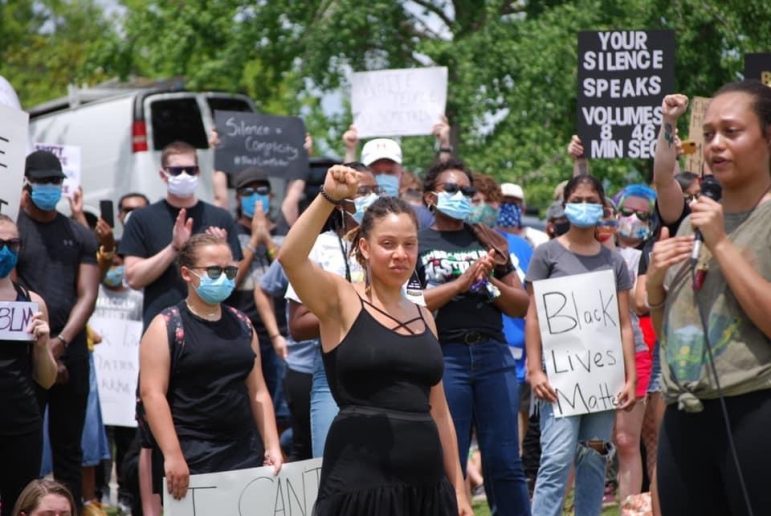The group Alabama Rally Against Injustice has hosted several demonstrations across the state in the wake of the police killing of George Floyd. Many of them have been in mostly-white suburbs, and they’ve drawn hundreds of protesters. One of the people behind these rallies is Celida Soto, a community organizer. She said leading rallies week after week is emotionally draining, but necessary for the movement.
The fiery Afro-Latina mother sees herself as a warrior, and a protector for her family, friends and community. Her passion for activism began 20 years ago. Soto is an advocacy coordinator for Alabama Arise, an organization fighting poverty.
She recently joined forces with Alabama Rally Against Injustice to protest racism and police brutality. The most emotional moments during the rallies, Soto said, have been the re-enactments of Floyd’s death.
During most rallies, Soto asks demonstrators to lie on the ground while imagining what Floyd went through. She said the simulation of that moment is important for all protesters, especially white allies.
“Empathy doesn’t come so easily for everyone,” she said. “We all walk in different levels of awareness and sometimes it’s important to kind of get in position, even though we will never really be in that state of fear, discomfort and ail.”
“I think simulating it, getting down on the ground even without a knee on your neck, helps people kind of feel a little bit closer to George and closer to the black experience,” she said. “That simulation was powerful because it gave people in general an opportunity to experience just a hint of what Mr. Floyd had gone through.”
It’s an extremely emotional experience. Some demonstrators cry, others are filled with rage. The rallies, she said, have never gotten out of hand. But Soto said that doesn’t mean they’re peaceful protests.
“That’s one of the first things I say, ‘our protests are not peaceful,'” Soto said. “No one is at peace, people are in a state of unrest, they’re very frustrated, they’re hurting.” She said just because capitalist structures are not being vandalized or destroyed, doesn’t mean that “our” people are peaceful.
Soto said her role is not to manage people’s emotions. Instead, she teaches protesters their rights in case there are run-ins with law enforcement. She trains them on what to do and what not to do to prevent police encounters from escalating.
She sees these rallies as teachable moments. They’re a platform to school demonstrators on decades-old policing policies, which Soto hopes to change.
Organizers of @AlabamaRally are demanding changes in law enforcement while gathering in Hoover this afternoon. The city was under fire in 2018 for the police killing of #EJBradford at the Riverchase Galleria. pic.twitter.com/p3nA8kPJdH
— Janae Pierre (@missjanaepierre) June 6, 2020
Soto said Alabama Rally Against Injustice is focusing efforts on one thing: policy.
“It has to be visceral,” she said. “It’s a multi-pronged approach. We’re still organizing demonstrations because the visibility of the unrest is critical for the movement. But then it’s also working with policy experts.” She said the group is beyond discussions. “We’ve had conversations with elected officials and law enforcement leaders for years now so we’re not going there anymore,” she said. “We’re sitting down for an actual plan and to draft a new policies.”
The group has had several requests to lead more demonstrations around the state. In the next few weeks, Soto and other organizers will head to St. Clair and Cullman counties — two places that have overwhelmingly white populations — to continue their rally against injustice.

